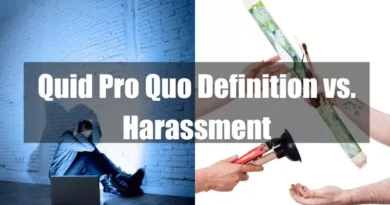Is Quid Pro Quo Legal?
Takeaways
| Key Points |
|---|
| In most business or personal transactions, quid pro quo is legal when both parties exchange something of value. This is the foundation of many contracts, such as paying for services or goods. |
| It becomes illegal when used in the context of sexual harassment, such as when someone in power demands sexual favors in exchange for job benefits, which is prohibited under U.S. law. |
| In politics, quid pro quo is illegal when it involves bribery or corruption, such as a public official trading favors or legislation for personal benefits like money or gifts. |
| Lobbying and campaign contributions often fall into legal gray areas. While making donations to support political campaigns is legal, explicitly offering them in exchange for specific political favors could be considered illegal quid pro quo. |
Infographic

Introduction
The legality of quid pro quo depends heavily on the context in which it occurs. In its simplest form, quid pro quo means “something for something” and refers to an exchange where each party provides something of value to the other. Such exchanges are often legal, particularly in business or personal transactions. However, certain types of quid pro quo arrangements can be illegal or unethical, especially when they involve power dynamics, coercion, or violate laws governing employment, bribery, or politics.
Legal Quid Pro Quo in Contracts
In most contractual agreements, quid pro quo is entirely legal. For instance, when two parties agree to exchange services for payment or goods, this forms a legally binding contract. This form of quid pro quo is the foundation of most business transactions. For example, an employer agreeing to pay an employee a salary in exchange for their work or a tenant paying rent in return for living in a property represents lawful quid pro quo under contractual law.

Illegal Quid Pro Quo in Sexual Harassment
However, quid pro quo becomes illegal when it involves certain inappropriate exchanges, such as sexual harassment. In employment settings, quid pro quo harassment occurs when a supervisor or person of authority demands sexual favors from an employee in exchange for job benefits like promotions, pay raises, or even job security. This type of quid pro quo is illegal under U.S. law, as it exploits power dynamics and coerces individuals into unwanted actions in exchange for professional advancement.
Quid Pro Quo in Bribery and Corruption

Quid pro quo also becomes illegal in cases of bribery and corruption. In the political sphere, an exchange in which a public official provides favors, decisions, or legislation in return for personal benefits, such as money or gifts, constitutes bribery. For instance, a politician who accepts campaign donations with an explicit agreement to pass legislation favorable to the donor would be engaging in an illegal quid pro quo.
Federal laws, such as the Federal Election Campaign Act, aim to limit such practices to prevent corruption in government. However, while FECA plays a significant role, other laws, like 18 U.S.C. § 201 (bribery of public officials), also address corrupt practices directly related to quid pro quo bribery.

The Gray Areas: Lobbying and Campaign Contributions
The legality of quid pro quo in politics can sometimes blur into gray areas, particularly when it comes to lobbying and campaign contributions. While giving money to support a politician’s campaign is legal, doing so with the expectation of specific political favors can cross the line into illegal quid pro quo. Courts have debated the fine line between legal lobbying and illegal bribery, but quid pro quo arrangements involving direct exchanges for political actions are generally illegal.
Conclusion
Quid pro quo is legal in many situations where it represents a fair exchange between parties, as seen in typical contracts or business dealings. However, it becomes illegal when it involves coercion, power abuse, or violations of employment, bribery, or campaign finance laws. Understanding the context and nature of the exchange is crucial in determining the legality of any quid pro quo arrangement.
FAQ
What is the legal concept of Quid Pro Quo?
Quid pro quo, Latin for “this for that,” refers to an exchange where one party provides something of value to another in return for a reciprocal benefit. In legal contexts, quid pro quo is fundamental in contract law, where mutual Consideration is essential for a valid agreement. In employment law, particularly concerning sexual harassment, it describes situations where employment benefits are conditioned upon submission to unwelcome sexual advances. In criminal law, especially in bribery cases, it involves the exchange of something valuable for official acts.
How does quid pro quo apply in contract law?
In contract law, quid pro quo is synonymous with the concept of Consideration. For a contract to be legally binding, there must be an exchange of value between the parties involved. Each party must provide something of value, whether it’s goods, services, money, or a promise to act or refrain from acting in a certain way. Without such mutual Consideration, a contract may be deemed invalid.
What constitutes quid pro quo sexual harassment in the workplace?
Quid pro quo sexual harassment occurs when a person in a position of authority demands sexual favors from a subordinate in exchange for employment benefits, such as promotions, salary increases, or continued employment. This form of harassment is explicitly prohibited under Title VII of the Civil Rights Act of 1964. A notable case illustrating this is Kerin v. Schenectady ARC, where the court examined allegations of a supervisor making suggestive gestures and conditioning job security on the employee’s acquiescence.
How is quid pro quo relevant in bribery and corruption cases?
In bribery and corruption cases, quid pro quo refers to the exchange of something of value for official actions or influence. For instance, offering money or gifts to a public official in return for favorable decisions or actions constitutes Bribery. The U.S. Supreme Court case McDonnell v. United States highlighted the necessity of proving an explicit agreement between the giver and receiver to establish quid pro quo corruption.
Can campaign contributions be considered quid pro quo corruption?
Campaign contributions can be deemed quid pro quo corruption if there is evidence of an explicit agreement between the donor and the candidate, where the contribution is made in exchange for specific official actions. The Federal Election Campaign Act regulates such contributions to prevent corruption. However, proving quid pro quo in this context requires clear evidence of a direct exchange.
How does quid pro quo function in international anti-corruption laws?
International anti-corruption laws, such as the Corruption of Foreign Public Officials Act (CFPOA) in Canada, criminalize Bribery of foreign public officials. A key element in these cases is proving a quid pro quo arrangement, where a benefit is provided to a foreign official in exchange for favorable business advantages. In R v. Arapakota, the court acquitted the defendant due to insufficient evidence of such an exchange, emphasizing the necessity of demonstrating a clear quid pro quo to secure a conviction.
What is the significance of quid pro quo in political corruption cases?
In political corruption cases, quid pro quo involves the exchange of favors between politicians and individuals or entities, often in the form of bribes or kickbacks. For example, in the case against former New York Lieutenant Governor Brian Benjamin, prosecutors alleged that he directed state funds to a developer in exchange for campaign contributions, highlighting the quid pro quo nature of the alleged corruption.
How is quid pro quo interpreted in employment law?
Beyond sexual harassment, quid pro quo in employment law can refer to any situation where employment benefits are conditioned upon an employee providing something in return, which can include non-sexual favors or actions. Such practices are generally prohibited, as they can lead to unfair treatment and exploitation of employees.
Can quid pro quo arrangements be legal in business transactions?
Yes, quid pro quo arrangements are legal and common in business transactions, provided they involve a fair and transparent exchange of goods, services, or other considerations. For instance, bartering agreements, where one party provides goods or services in exchange for different goods or services of equivalent value, are legitimate quid pro quo transactions. However, they become illegal if such arrangements involve coercion, deception, or violate laws or regulations.
How does the concept of quid pro quo differ between civil and criminal law?
In civil law, quid pro quo pertains to the mutual exchange necessary for contract formation, known as Consideration. In criminal law, it often relates to corrupt practices, such as Bribery, where something of value is exchanged for illicit services or influence. The interpretation and implications of quid pro quo thus vary significantly between civil and criminal contexts.
What role does quid pro quo play in sexual harassment lawsuits?
In sexual harassment lawsuits, establishing a quid pro quo scenario is crucial for certain claims. The plaintiff must demonstrate that tangible employment benefits were conditioned upon submission to unwelcome sexual advances or conduct. Evidence of such conditional exchanges can lead to employer liability under anti-discrimination laws.
How is Consideration defined in contract law?
Consideration is something of value exchanged between parties, which is necessary for a contract to be legally binding. In contract law, Consideration can be a promise to perform a certain action or to refrain from doing something. Without Consideration, a contract may be deemed unenforceable.
What constitutes Quid Pro Quo Sexual Harassment?
A form of sexual harassment where submission to unwelcome sexual conduct is made a condition of employment benefits. Under Title VII of the Civil Rights Act of 1964, quid pro quo sexual harassment occurs when employment decisions are based on an employee’s submission to or rejection of sexual advances. This form of harassment is explicitly prohibited and can lead to significant legal consequences for employers.
How is Bribery legally defined?
Bribery involves the offering, giving, receiving, or soliciting of something of value as a means to influence the actions of an official or other person in a position of authority. In legal terms, Bribery entails a quid pro quo arrangement where a benefit is exchanged for favorable treatment. For instance, offering money or gifts to a public official in return for favorable decisions or actions constitutes Bribery. Such illegal actions can lead to severe penalties, including fines and imprisonment.
What is the Reciprocity Principle in contract law?
A legal principle stating that in bilateral contracts, neither party is entitled to enforce the contract unless they have performed or are ready to perform their own obligations. This principle ensures that both parties uphold their contractual duties. If one party fails to perform their obligations, the other party may be released from their contractual duties or may seek legal remedies.
How is an Official Act defined in legal terms?
A decision or action on a matter involving the formal exercise of governmental power. Determining what constitutes an “official act” is crucial in bribery cases. The U.S. Supreme Court has clarified that setting up meetings or hosting events does not qualify as official acts unless they involve formal governmental decisions. This distinction is important in legal proceedings to establish whether an action falls under the purview of official duties.
What is meant by Tangible Employment Action?
A significant change in employment status or benefits, such as hiring, firing, promotion, or reassignment. In quid pro quo sexual harassment cases, a tangible employment action results from an employee’s acceptance or rejection of a supervisor’s sexual advances. Such actions are central to establishing employer liability under Title VII.
How is Unjust Enrichment defined in legal contexts?
A legal principle preventing one party from being unjustly enriched at the expense of another. In contract disputes, if a contract is voided or unenforceable, a party may seek restitution under unjust enrichment to recover benefits conferred to the other party. This principle ensures fairness when no valid contract exists.
What is a Condition Precedent in contract law?
An event or state of affairs that must occur before a duty to perform a contract arises. In contractual agreements, a condition precedent specifies an event that must happen before a party is obligated to perform their part of the contract. For example, in a real estate transaction, obtaining financing may be a condition precedent to the buyer’s obligation to purchase the property.
What constitutes an Explicit Agreement in legal terms?
A clearly stated agreement between parties leaving no room for ambiguity. In legal contexts, an explicit agreement is one where all parties involved clearly define and understand the terms. Such agreements are essential in contract law to ensure that all parties are aware of their obligations and rights.
How are Campaign Contributions regulated in law?
Donations made to political candidates, parties, or committees to support election campaigns. While campaign contributions are legal, they can be scrutinized if linked to quid pro quo arrangements. The Federal Election Campaign Act regulates such contributions to prevent corruption, requiring clear evidence of an exchange for official acts to establish illegality.
What is the legal definition of Extortion?
Extortion is the act of obtaining property, money, or services from an individual or institution through coercion, threats, or intimidation. In legal contexts, Extortion involves a quid pro quo where the perpetrator demands something of value in exchange for not carrying out a threatened action, such as violence, exposure of sensitive information, or other harm. Unlike Bribery, where both parties may willingly engage in the exchange, Extortion is characterized by the victim’s lack of consent due to coercion. Extortion is a criminal offense and is punishable under various statutes, including the Hobbs Act in the United States, which addresses Extortion affecting interstate or foreign commerce.
How is the term ‘Kickback’ defined in legal terms?
A kickback is a form of negotiated Bribery in which a commission is paid to the bribe-taker in exchange for services rendered. In legal terms, a kickback involves a quid pro quo arrangement where an individual with influence over a decision-making process receives a portion of the profits from a transaction they facilitated. For example, a contractor might pay a government official a percentage of the contract’s value in exchange for being awarded a government project. Kickbacks are illegal and are considered a form of corruption, leading to criminal charges and penalties upon conviction.
What does ‘Pay-to-Play’ mean in a legal context?
‘Pay-to-play’ refers to a practice where businesses make campaign contributions or other payments to government officials or politicians in exchange for the opportunity to engage in business or receive contracts. Legally, ‘Pay-to-Play’ arrangements constitute a quid pro quo where the payment is made with the expectation of receiving favorable treatment in return. Such practices are often subject to anti-corruption laws and regulations designed to prevent undue influence over public officials. For instance, the Securities and Exchange Commission (SEC) has rules prohibiting investment advisors from providing advisory services to government clients within two years after making a political contribution to officials of that client, aiming to curb ‘Pay-to-Play’ practices.
How is ‘Influence Peddling’ defined and applied in law?
Influence peddling involves the act of using one’s influence in government or connections with persons in authority to obtain favors or preferential treatment for another, usually in return for payment. In legal contexts, influence peddling is a form of corruption where an individual sells their ability to influence the decision-making process of government officials or agencies. This quid pro quo arrangement is illegal in many jurisdictions, as it undermines the integrity of public administration. Laws against influence peddling aim to prevent individuals from exploiting their positions or connections for personal gain, ensuring that governmental decisions are made based on merit and public interest rather than personal relationships or financial incentives.









